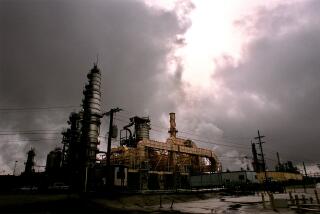Reducing Reliance on Mideast Oil
- Share via
James Flanigan says that with the end of the war, in perhaps two years, the world, and the U.S., will be less reliant on Middle East oil [“After War, A World Economy Less Reliant on Middle East,” Oct. 14].
His optimism is exemplified by the statement, “The aftermath of war will see pipelines laid through Afghanistan to bring Central Asian oil to Pakistan and India.”
Afghanistan may be pacified, but the larger problem of India relying on a pipeline through Pakistan is dubious.
Should such friendliness evolve, there is the matter of cost. A pipeline from Central Asia through Afghanistan to Pakistan and India will involve drilling costs, payments to the several countries involved and the cost of a long pipeline. Compare this with the cost of pumping oil into a tanker at Iraq, Iran or Saudi Arabia and a short steam through the Persian Gulf and the Arabian Sea to Pakistan and India.
To reduce reliance on Mideast oil by drilling in places such as the Caspian Sea and Alaska, which need long, expensive pipelines, seems certain to bring us to the days of $3-plus per gallon of gas.
Business can’t leave known sources of oil to stand idle, but the drilling and delivery costs will raise the average price of all oil.
Ray Tapar
Encino
*
Your article goes to the very heart of the major problem we in the U.S. are faced with in this century. Until we become less dependent on Middle East oil, our economy and our security will remain in jeopardy. The article indicates that we may well be headed in the direction of lesser dependence because of availability of oil from less volatile sectors and because of steps being taken to conserve energy in general.
It is my view that it is now within the state of the art to provide energy from other proven sources in significant amounts to wean us from oil almost completely. I refer of course to fuel cells, hydrogen and so forth.
With that in mind, I wonder why we don’t bring together a new “Manhattan-type” project to address ways to exploit what we already know, set up an infrastructure to manage these new forms of energy and thus rid ourselves of dependence on foreign oil. In the interim, we have enough proven reserves to carry us through the time required to bring such a plan to fruition.
George Jacobi
Lynn Haven, Fla
More to Read
Inside the business of entertainment
The Wide Shot brings you news, analysis and insights on everything from streaming wars to production — and what it all means for the future.
You may occasionally receive promotional content from the Los Angeles Times.










